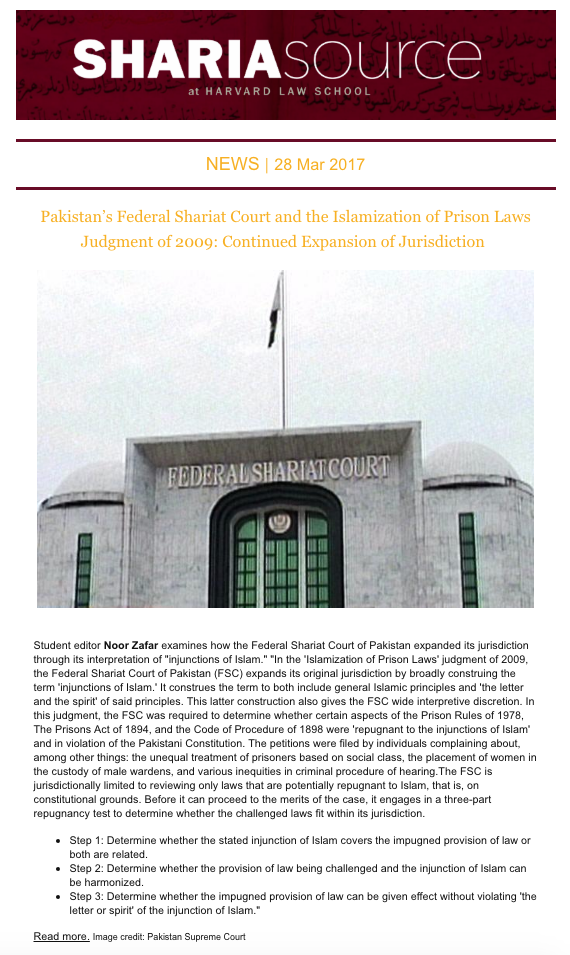
 Pakistan’s Federal Shariat Court and the Islamization of Prison Laws Judgment of 2009: Continued Expansion of Jurisdiction Student editor Noor Zafar examines how the Federal Shariat Court of Pakistan expanded its jurisdiction through its interpretation of “injunctions of Islam.” “In the ‘Islamization of Prison Laws’ judgment of 2009, the Federal Shariat Court of Pakistan (FSC) expands its original jurisdiction by broadly construing the term ‘injunctions of Islam.’ It construes the term to both include general Islamic principles and ‘the letter and the spirit’ of said principles. This latter construction also gives the FSC wide interpretive discretion. In this judgment, the FSC was required to determine whether certain aspects of the Prison Rules of 1978, The Prisons Act of 1894, and the Code of Procedure of 1898 were ‘repugnant to the injunctions of Islam’ and in violation of the Pakistani Constitution. The petitions were filed by individuals complaining about, among other things: the unequal treatment of prisoners based on social class, the placement of women in the custody of male wardens, and various inequities in criminal procedure of hearing.The FSC is jurisdictionally limited to reviewing only laws that are potentially repugnant to Islam, that is, on constitutional grounds. Before it can proceed to the merits of the case, it engages in a three-part repugnancy test to determine whether the challenged laws fit within its jurisdiction.
Pakistan’s Federal Shariat Court and the Islamization of Prison Laws Judgment of 2009: Continued Expansion of Jurisdiction Student editor Noor Zafar examines how the Federal Shariat Court of Pakistan expanded its jurisdiction through its interpretation of “injunctions of Islam.” “In the ‘Islamization of Prison Laws’ judgment of 2009, the Federal Shariat Court of Pakistan (FSC) expands its original jurisdiction by broadly construing the term ‘injunctions of Islam.’ It construes the term to both include general Islamic principles and ‘the letter and the spirit’ of said principles. This latter construction also gives the FSC wide interpretive discretion. In this judgment, the FSC was required to determine whether certain aspects of the Prison Rules of 1978, The Prisons Act of 1894, and the Code of Procedure of 1898 were ‘repugnant to the injunctions of Islam’ and in violation of the Pakistani Constitution. The petitions were filed by individuals complaining about, among other things: the unequal treatment of prisoners based on social class, the placement of women in the custody of male wardens, and various inequities in criminal procedure of hearing.The FSC is jurisdictionally limited to reviewing only laws that are potentially repugnant to Islam, that is, on constitutional grounds. Before it can proceed to the merits of the case, it engages in a three-part repugnancy test to determine whether the challenged laws fit within its jurisdiction.
-
Step 1: Determine whether the stated injunction of Islam covers the impugned provision of law or both are related.
-
Step 2: Determine whether the provision of law being challenged and the injunction of Islam can be harmonized.
-
Step 3: Determine whether the impugned provision of law can be given effect without violating ‘the letter or spirit’ of the injunction of Islam.” Read more.
Image credit: Pakistan Supreme Court
 Pakistan Penal Code (Act No. XLV of 1860) “This is the original and current Pakistani criminal code, dating from the British Raj. It has been amended and revised over the years.” Pakistan’s Federal Shariat Court analyzed this code, along with many others, for its 2009 “Islamization of Prison Laws” judgment of whether contemporary penal codes were in violation of Islam. Read the code. Image credit: The Express Tribune Blog
Pakistan Penal Code (Act No. XLV of 1860) “This is the original and current Pakistani criminal code, dating from the British Raj. It has been amended and revised over the years.” Pakistan’s Federal Shariat Court analyzed this code, along with many others, for its 2009 “Islamization of Prison Laws” judgment of whether contemporary penal codes were in violation of Islam. Read the code. Image credit: The Express Tribune Blog
 Islamic Law in U.S. Courts: Husein v. Husein and Husein, WL 842023 (Ohio Ct. App. 2001) This case examines how matters of divorce and inheritance under Islamic law can be decided in U.S. courts when the circumstances have multiple people claiming to be a deceased individual’s living spouse. This is part of SHARIAsource’s Islamic Law in U.S. Courts series. Read more. Image credit: United States Supreme Court
Islamic Law in U.S. Courts: Husein v. Husein and Husein, WL 842023 (Ohio Ct. App. 2001) This case examines how matters of divorce and inheritance under Islamic law can be decided in U.S. courts when the circumstances have multiple people claiming to be a deceased individual’s living spouse. This is part of SHARIAsource’s Islamic Law in U.S. Courts series. Read more. Image credit: United States Supreme Court
See the full newsletter.

